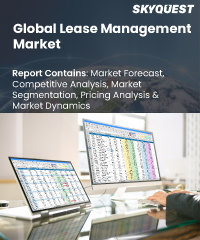
Report ID: SQMIG45F2117

Report ID:
SQMIG45F2117 |
Region:
Global |
Published Date: December, 2024
Pages:
157
|
Tables:
61 |
Figures:
75
Lease Management Market size was valued at USD 5.77 Billion in 2023 and is poised to grow from USD 6.17 Billion in 2024 to USD 10.52 Billion by 2032, growing at a CAGR of 6.9% during the forecast period (2025-2032).
The global lease management market was experiencing substantial growth and was anticipated to expand further in the coming years. One of the key drivers of the market is the increasing adoption of lease accounting standards. Regulatory changes, such as the introduction of new lease accounting standards like ASC 842 and IFRS 16, have compelled companies to streamline their lease management processes and ensure compliance with these standards. Lease management software provides the necessary tools and capabilities to handle complex lease accounting requirements, driving its demand among businesses across various industries. Another driver is the growing focus on cost optimization and operational efficiency. Lease management solutions help organisations effectively manage lease agreements, enabling them to optimise lease expenses, reduce manual errors, and avoid costly penalties. As businesses seek to streamline their lease administration processes and minimise financial risks, the adoption of lease management software becomes a strategic imperative. Moreover, the increasing complexity of lease portfolios has further fueled the demand for lease management solutions. With businesses dealing with diverse lease types, terms, and structures, the need for centralised lease data repositories, automated workflows, and reporting functionalities has grown significantly. Lease management software offers a centralised platform to manage and monitor leases efficiently, supporting decision-making processes. Despite the market's positive growth prospects, there are certain challenges that impact its adoption and expansion.
One of the primary challenges is the reluctance of small and medium-sized enterprises (SMEs) to invest in lease management software. SMEs may find it challenging to justify the costs associated with implementing lease management solutions, especially if they have a limited number of leases or less complex lease portfolios. Additionally, the integration of lease management software with existing enterprise systems can be complex and time-consuming. Organisations may face challenges in seamlessly integrating lease management solutions with their ERP, accounting, or other enterprise systems, leading to potential disruptions during the implementation process. Furthermore, data security and privacy concerns pose another challenge. As lease management systems store sensitive financial and contractual information, ensuring data security and compliance with data protection regulations becomes crucial for both vendors and users.
US Lease Management Market is poised to grow at a sustainable CAGR for the next forecast year.
Our industry expert will work with you to provide you with customized data in a short amount of time.
REQUEST FREE CUSTOMIZATIONWant to customize this report? This report can be personalized according to your needs. Our analysts and industry experts will work directly with you to understand your requirements and provide you with customized data in a short amount of time. We offer $1000 worth of FREE customization at the time of purchase.

Report ID: SQMIG45F2117